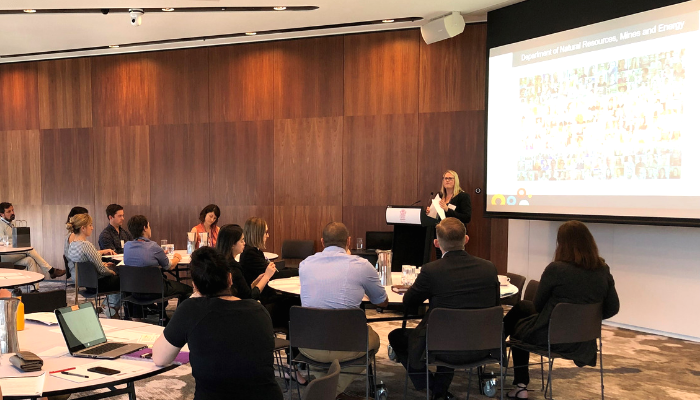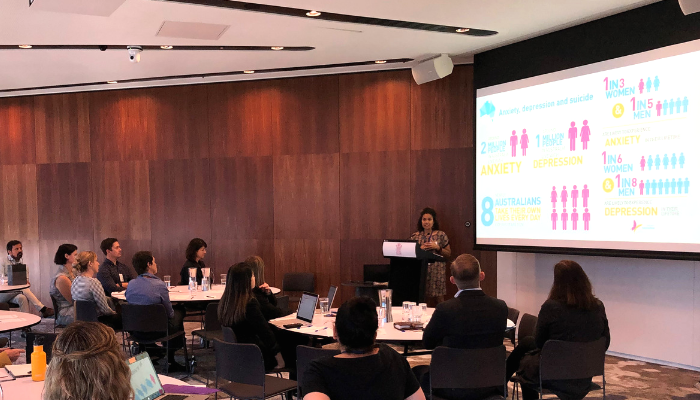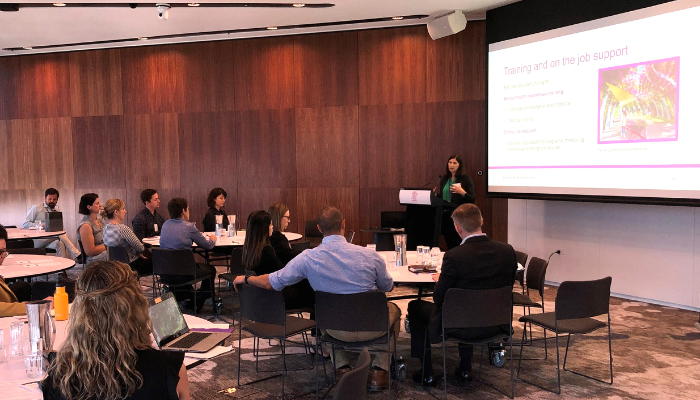Managing Mental Health at Work

Photo: Celia Venables, Executive Director – Human Resources at DNRME, speaking at the JobAccess Alumni event
Event wrap: Supportive culture vital to building mentally healthy workplaces
Brisbane, 24 October 2018
An encouraging environment and supportive employer-employee relationships are essential to tackle mental health issues at work. Industry experts and employers highlighted this message at ‘Managing Mental Health at Work’, a JobAccess Alumni event held in Brisbane on 24 October 2018 in collaboration with JobAccess alumni partner, Department of Natural Resources, Mines and Energy (DNRME), Queensland. JobAccess also facilitated a mental health workshop to enable participants to recognise early warning signs of mental ill health at work and equip them with early intervention skills. Here are key highlights from the event:
Employee wellbeing core to decision making
Celia Venables, Executive Director – Human Resources at DNRME, in her opening remarks said, “Respect, safety and wellbeing underpin our decision making. We don’t always get it right, but we keep trying.” DNRME places a strong emphasis on the health, safety and wellbeing of its diverse employees, customers and stakeholders. The Department has established a peer group of 52 wellbeing ambassadors to promote mental and physical wellbeing in the workplace through a range of initiatives. “Being different is just who we are.” Celia shared that through these initiatives, “Our goal is to being ‘me’ in DNRME.”
Talking about mental health is the first step

Photo: Roxy Alia, beyondblue Ambassador, sharing key facts on mental health issues
Guest speaker and beyondblue Ambassador Roxy Alia shared key statistics on mental health issues.
- Around 2 million people in Australia live with anxiety, while about 1 million live with depression.
- 1 in 3 women and 1 in 5 men are likely to experience anxiety in their lifetime
- 1 in 6 women and 1 in 8 men are likely to experience depression in their lifetime
- Nearly 8 Australians take their own lives every day due to mental health issues, 6 of whom are men.
Roxy further added that having a conversation with family and friends, and visiting the GP are the first steps for someone experiencing mental health issues to get the support they need. She also shared how family members, friends and colleagues can approach the conversation. “There is no wrong or right way to let them know you’re concerned, just explain why. If they are not ready to talk, let them know that it’s OK and revisit the conversation another time.”
Mental ill health costing Australian businesses

Photo: JobAccess Professional Adviser details how employers can effectively manage mental health issues at work
The General Manager at JobAccess, citing a recent PwC report on mental health in the workplace said, “Untreated mental health conditions cost Australian employers $10.9 billion every year through absenteeism, reduced productivity and compensation claims.” Other effects of mentally unhealthy workplaces include poor staff morale and low engagement, high turnover, potential penalties for breaches of work, health and safety legislation.
Referring to a beyondblue report, JobAccess said that employees working in mentally unhealthy workplaces are more likely to observe the symptoms of depression and anxiety among their colleagues. “The higher the value an employer places on a mentally healthy workplace, more significant are the attitudinal and behavioural benefits it can reap. First, it cuts the level of absenteeism due to mental health conditions by half, and employees have more positive perceptions of mental health in the workplace.”
A JobAccess Professional Adviser explained how simple adjustments in the workplace make a difference. “Offering flexible work conditions and providing individualised supervision and support are some of the ways employers can support employees tackle mental health issues.”
Mental health awareness training is another way employers can effectively manage common mental health problems at work. “The training seeks to increase awareness, reduce stigma, improve attitudes, as well as increase the confidence of employers and co-workers to assist someone to seek help,” the JobAccess Adviser said.
The Australian Government’s Employment Assistance Fund provides funding of up to $1,500 per annum to employers for each eligible employee to conduct training at the workplace by a reputable organisation and delivered by qualified professionals with specialist expertise.
Last updated:
